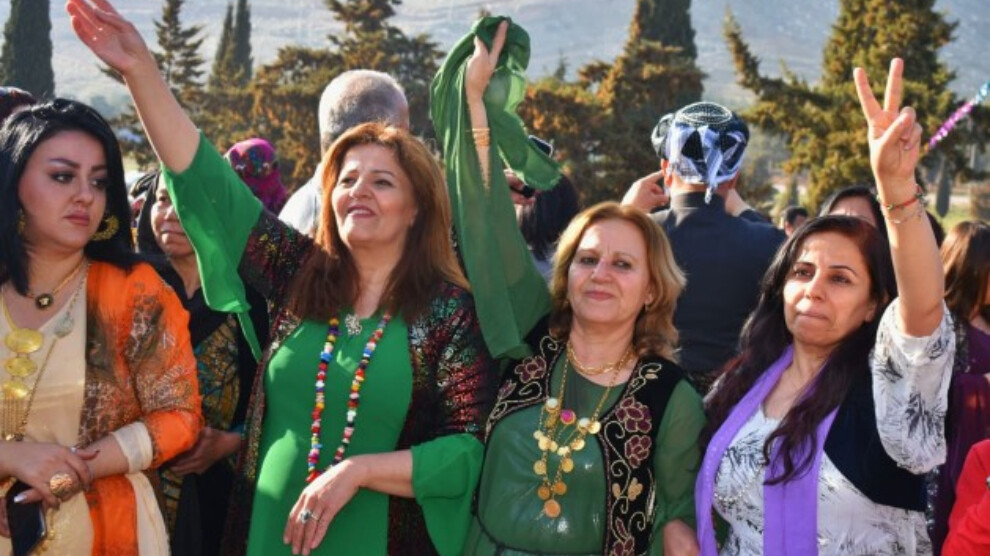Women in Southern Kurdistan
Women in Southern Kurdistan have an important and deep legacy of struggle. From Hapsa Xan, who founded the first school for girls, to Adile Xanim, the administrator of Halabja, to Leyla Qasim, who was executed by the Baath regime, to Xwîşka Halîme, a peshmerga commander, there are important female figures who have managed to write their names in golden letters in history. Women also took their place in the resistance against the occupation of Southern Kurdistan by regional and international powers, and women and children were the most affected by the genocidal attacks of the Baath regime. Hundreds of thousands of women were displaced along with their children, especially after the evacuation and destruction of thousands of Kurdish villages in the 1980s. Some of them crossed the borders of Northern and Eastern Kurdistan on foot and migrated to Europe, while the majority struggled to survive in towns and cities under great hardship. Under the Baathist regime, an unknown number of Kurdish women were also kidnapped, subjected to sexual violence, sold as trophies to men in other countries or murdered. Therefore, the genocide perpetrated by the Saddam regime against the people of Southern Kurdistan was also a genocide against women.
Although women have led popular uprisings in Southern Kurdistan and paid the heaviest price for the genocidal attacks, today they are unable to take their place in social, political, economic and cultural life on an equal level. This is because the effects of sexism and patriarchy in the form of dynasty and feudalism dominate the political, social and economic system today. Although women have a 25 percent quota in the Kurdistan Regional Parliament, their representation in government is still very weak. Only in 2019, the number of female ministers was increased from 1 to 3 as a result of women’s efforts. The representation and participation of women in political decision-making processes varies according to the political party and tradition they belong to. For example, the ‘Partiya Demokrat a Kurdistanê’ [Kurdistan Democratic Party, KDP] does not include any women in its main decision-making bodies, while ‘Tevgera Azadiyê’ (Freedom Movement) is organized according to the co-chairmanship system. Although almost all political parties have women’s organizations, their impact on general politics varies according to their ideological approach.
There are many women’s associations in Southern Kurdistan. However, it is difficult to talk about the existence of a women’s movement that encompasses all of them. As a result of fragmentation and an elitist organizing approach that does not base itself on the grassroots, women’s influence in political, social, economic, legal, etc. fields remains limited.
The ‘Rêxistina Jinên Azad ên Kurdistan’ (Organization of the Free Women of Kurdistan, RJAK) makes a difference in this context and organizes itself based on the grassroots. It aims to reach out directly to the women of the south, not only in cities and towns, but also in rural areas and villages, and to create changes in education, production and action. It is based on creating a consciousness of freedom among women and unleashing their organized power. It fights both for the real freedom of Kurdistan and against the male-dominated mentality.
Women in Southern Kurdistan today face multifaceted and profound problems. The effects of the migration from the villages to the city, which brought with it a break with traditional ways of production and life, are still very strong today. While women are actively involved in production in the villages, the same is not true in the city, and the employment rate of women is extremely low compared to men. Violence against women is rife in southern society. As a result, dozens of women are either murdered by those closest to them or driven to suicide every month. Sexism can manifest itself in extreme forms in all areas of life. Recently, there has been a significant increase in digital violence. Again, there are great inequalities in the legal field, and laws in favor of women mostly remain on paper and are not implemented.
While women are struggling against all these problems on a certain level, the urgency to raise a more organized, grassroots and radical line of resistance is increasingly imposing itself.

